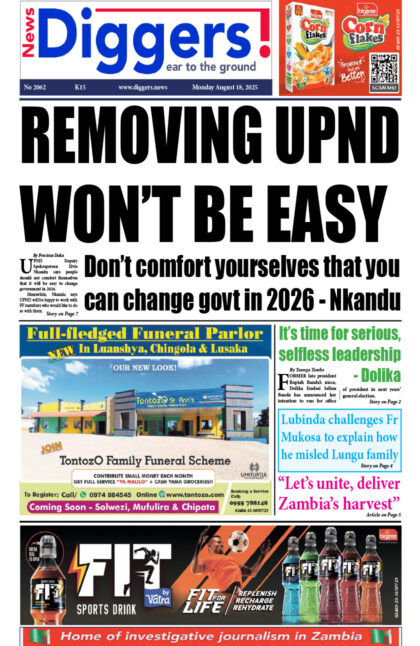Publish What You Pay (PWYP) says it expects the 2020 national budget to explore strategies for investing windfall earnings into sovereign wealth funds as a key strategy to get Zambia out of its current fiscal deficit.
In a statement, the PWYP Zambia Coalition, an NGO focused on campaigning for an open and accountable extractive sector, among others, stated that next year’s budget expected to be announced this Friday should contain strategies for investing windfall earnings into sovereign wealth funds to resolve the current economic challenges.
PWYP equally called for the inclusion of the Mineral Revenue Sharing Mechanism in next year’s budget to ensure that host communities where mining activities took place benefit more.
The Ministry of Finance had projected to hit a fiscal deficit target of 6.5 per cent of Gross Domestic Product (GDP) this year.
But government’s continuous expenditure on the back of a supplementary budget of K9.8 billion approved by lawmakers in July and huge external debt repayments against lower revenue inflows is set to widen the budget deficit.
“We specifically expect the 2020 budget to explore strategies for investing windfall earning and mineral rent into sovereign wealth funds, including stabilisation funds. This should actually be used as a strategy out of our current fiscal deficit, and develop a rent distribution system for allocating part of mineral revenue to communities near mining areas and local authorities. Article 253 (h) of the amended Constitution of the Republic of Zambia of 2016 on Land Environment and Natural Resources, states that: ‘investments in land to also benefit local communities and their economy.’ As such, such a provision is recognised by the supreme law of the land,” PWYP national coordinator Mtwalo Msoni stated in a press release, Thursday.
He observed that Zambia had still not been benefiting from mining despite its mineral resources having been exploited for over a century.
“After over a 100 years of successful mining in Zambia, one would believe that it would be time to reflect on the nation’s failure to properly account for how the sub-soil assets have translated into tangible development for mine host communities and the nation at large. We expect that after a decade of 7 changes to the mining tax regime aimed at optimizing revenues from the sector, we would have at least one change speaking to how we make use of the revenues from finite resources and how the host communities can have tangible benefits the resources,” stated Msoni, who also urged Finance Minister Dr Bwalya Ng’andu to include the much-needed Mineral Revenue Sharing Mechanism in the 2020 budget to positively impact host communities affected by mining activities.
“Mineral royalties (which form the largest portion of revenues from the mining sector), are payments received for consideration of the extraction of minerals. Moreover, why have mining companies pay royalties when there is nothing to show for them. Lost livelihoods, displacements and environmental liabilities remain the story for mine host communities. As provided for in the African Mining Vision of 2008, of which Zambia is a signatory, it is only rational for the country to develop a dedicated mechanism to make use of revenues from these finite resources, considering they form part of the nation’s subsoil capital wealth.”
PWYP was founded to campaign for oil, gas and mining companies to publish their payments to governments, such as licence fees, royalties and taxes, and for governments to be transparent about the revenues they receive.
This also constitutes the basis of the globally-renowned Extractive Industry Transparency Initiative (EITI) reporting, which seeks to address the key governance issues in the extractive sectors.
























